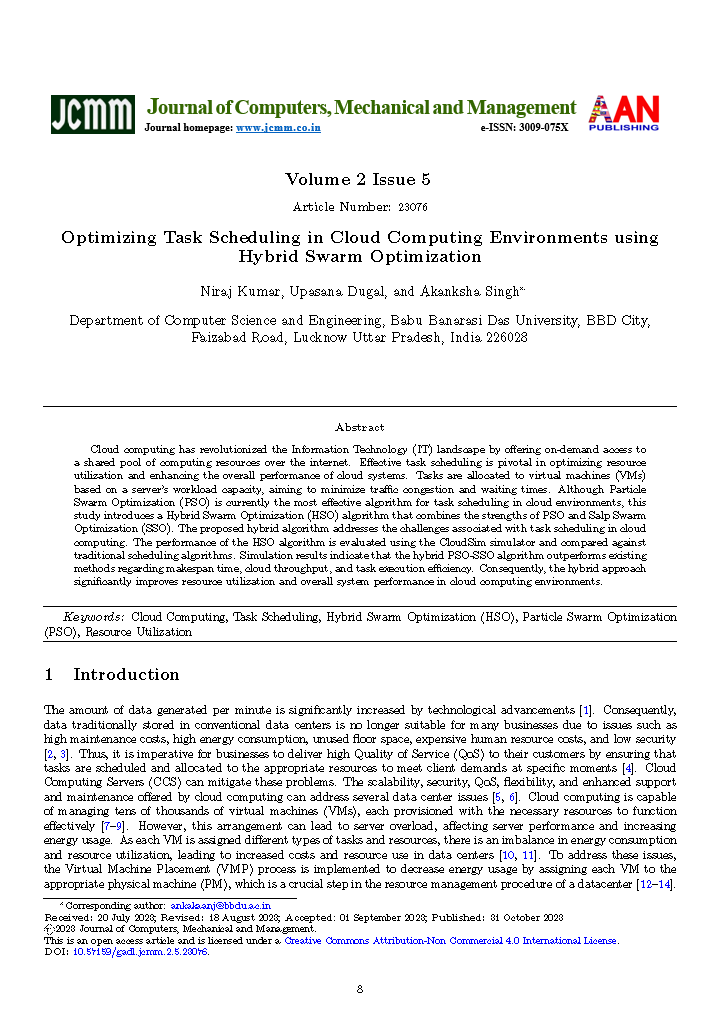Optimizing Task Scheduling in Cloud Computing Environments using Hybrid Swarm Optimization
DOI:
https://doi.org/10.57159/gadl.jcmm.2.5.23076Keywords:
Cloud Computing, Task Scheduling, Hybrid Swarm Optimization (HSO), Particle Swarm Optimization (PSO), Resource UtilizationAbstract
Cloud computing has revolutionized the Information Technology (IT) landscape by offering on-demand access to a shared pool of computing resources over the internet. Effective task scheduling is pivotal in optimizing resource utilization and enhancing the overall performance of cloud systems. Tasks are allocated to virtual machines (VMs) based on a server's workload capacity, aiming to minimize traffic congestion and waiting times. Although Particle Swarm Optimization (PSO) is currently the most effective algorithm for task scheduling in cloud environments, this study introduces a Hybrid Swarm Optimization (HSO) algorithm that combines the strengths of PSO and Salp Swarm Optimization (SSO). The proposed hybrid algorithm addresses the challenges associated with task scheduling in cloud computing. The performance of the HSO algorithm is evaluated using the CloudSim simulator and compared against traditional scheduling algorithms. Simulation results indicate that the hybrid PSO-SSO algorithm outperforms existing methods regarding makespan time, cloud throughput, and task execution efficiency. Consequently, the hybrid approach significantly improves resource utilization and overall system performance in cloud computing environments.
References
N. Khan, I. Yaqoob, I. A. T. Hashem, Z. Inayat, W. K. M. Ali, M. Alam, M. Shiraz, and A. Gani, “Big data: survey, technologies, opportunities, and challenges,” The Scientific World Journal, vol. 2014, 2014.
C. P. Chen and C.-Y. Zhang, “Data-intensive applications, challenges, techniques and technologies: A survey on big data,” Information Sciences, vol. 275, pp. 314–347, 2014.
I. A. T. Hashem, I. Yaqoob, N. B. Anuar, S. Mokhtar, A. Gani, and S. U. Khan, “The rise of ‘big data’ on cloud computing: Review and open research issues,” Information Systems, vol. 47, pp. 98–115, 2015.
M. A. Sharkh, M. Jammal, A. Shami, and A. Ouda, “Resource allocation in a network-based cloud computing environment: design challenges,” IEEE Communications Magazine, vol. 51, no. 11, pp. 46–52, 2013.
M. Sajid and Z. Raza, “Cloud computing: Issues & challenges,” in International conference on cloud, big data and trust, vol. 20, pp. 13–15, sn, 2013.
B. Wang, Z. Qi, R. Ma, H. Guan, and A. V. Vasilakos, “A survey on data center networking for cloud computing,” Computer Networks, vol. 91, pp. 528–547, 2015.
A. Beloglazov, “Energy-efficient management of virtual machines in data centers for cloud computing,” 2013.
M. El-Refaey, Virtual machines provisioning and migration services. Cloud Computing, 2011.
S. S. Manvi and G. K. Shyam, “Resource management for infrastructure as a service (iaas) in cloud computing: A survey,” Journal of network and computer applications, vol. 41, pp. 424–440, 2014.
A. Beloglazov, J. Abawajy, and R. Buyya, “Energy-aware resource allocation heuristics for efficient management of data centers for cloud computing,” Future Generation Computer Systems, vol. 28, no. 5, pp. 755–768, 2012.
N. K. Sharma and G. R. M. Reddy, “Multi-objective energy efficient virtual machines allocation at the cloud data center,” IEEE Transactions on Services Computing, vol. 12, no. 1, pp. 158–171, 2016.
X. Li, Z. Qian, S. Lu, and J. Wu, “Energy efficient virtual machine placement algorithm with balanced and improved resource utilization in a data center,” Mathematical and Computer Modelling, vol. 58, no. 5-6, pp. 1222–1235, 2013.
M. Shelar, S. Sane, V. Kharat, and R. Jadhav, “Efficient virtual machine placement with energy saving in cloud data center,” International Journal of Cloud-Computing and Super-Computing, vol. 1, no. 1, pp. 15–26, 2014.
H. Feng, Y. Deng, and J. Li, “A global-energy-aware virtual machine placement strategy for cloud data centers,” Journal of Systems Architecture, vol. 116, p. 102048, 2021.
H. A. Kholidy, “An intelligent swarm based prediction approach for predicting cloud computing user resource needs,” Computer Communications, vol. 151, pp. 133–144, 2020.
A. S. Kumar, K. Parthiban, and S. S. Shankar, “An efficient task scheduling in a cloud computing environment using hybrid genetic algorithm-particle swarm optimization (ga-pso) algorithm,” in 2019 International Conference on Intelligent Sustainable Systems (ICISS), pp. 29–34, IEEE, 2019.
S. Mohanty, S. C. Moharana, H. Das, and S. C. Satpathy, “Qos aware group-based workload scheduling in cloud environment,” in Data Engineering and Communication Technology: Proceedings of 3rd ICDECT-2K19, pp. 953–960, Springer Singapore, 2020.
K. B. Thanh, L. M. Hoang Xuan, C. N. Khac, H. H. Dac, V. P. Tran, and H. T. Cong, “An auto-scaling vm game approach for multi-tier application with particle swarm optimization algorithm in cloud computing,” in 2018 International Conference on Advanced Technologies for Communications (ATC), pp. 326–331, IEEE, 2018.
B. Jana, M. Chakraborty, and T. Mandal, “A task scheduling technique based on particle swarm optimization algorithm in cloud environment,” in Soft Computing: Theories and Applications: Proceedings of SoCTA 2017, pp. 525–536, Springer Singapore, 2019.
A. Naseri and N. J. Navimipour, “A new agent-based method for qos-aware cloud service composition using particle swarm optimization algorithm,” Journal of Ambient Intelligence and Humanized Computing, vol. 10, pp. 1851–1864, 2019.
A. M. Senthil Kumar and M. Venkatesan, “Task scheduling in a cloud computing environment using hgpso algorithm,” Cluster Computing, vol. 22, no. Suppl 1, pp. 2179–2185, 2019.
L. Abualigah, M. Shehab, M. Alshinwan, and H. Alabool, “Salp swarm algorithm: A comprehensive survey,” Neural Computing and Applications, vol. 32, pp. 11195–11215, 2020.

Downloads
Published
How to Cite
Issue
Section
License
Copyright (c) 2023 Journal of Computers, Mechanical and Management

This work is licensed under a Creative Commons Attribution-NonCommercial 4.0 International License.
The Journal of Computers, Mechanical and Management applies the CC Attribution- Non-Commercial 4.0 International License to its published articles. While retaining copyright ownership of the content, the journal permits activities such as downloading, reusing, reprinting, modifying, distributing, and copying of the articles, as long as the original authors and source are appropriately cited. Proper attribution is ensured by citing the original publication.





